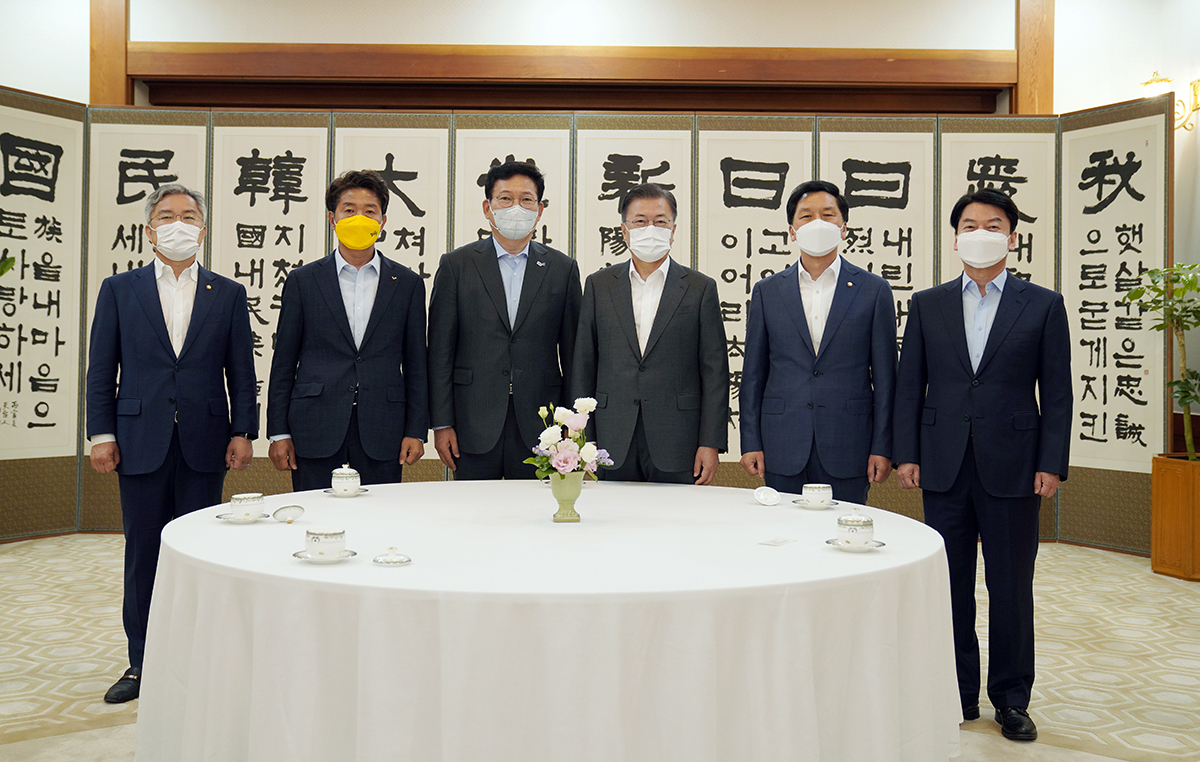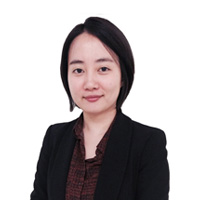Party leaders show mixed reactions to Moon-Biden summit
By Lee Ji-yoonPublished : May 26, 2021 - 17:25

The outcome of last week’s summit between Presidents Moon Jae-in and Joe Biden drew mixed reactions from political party leaders here on Wednesday.
Moon held a luncheon meeting with five party leaders at Cheong Wa Dae to brief them on the results of the summit. It was his first group meeting with the party leaders in a year and three months.
During the meeting, the president urged bipartisan support for follow-up measures to implement key commitments made during the summit. The discussion covered North Korea, COVID-19 vaccines and industrial partnerships such as the one on semiconductors.
Moon expressed his hopes for a breakthrough in the stalled diplomacy with North Korea, saying Biden’s recent appointment of a special envoy to North Korea showed Washington’s willingness to resume talks with the North.
“The joint statement recognizing both the Panmunjom and Singapore agreements has paved the way for the two Koreas and the US to start more advanced dialogue on the denuclearization of the Korean Peninsula,” Moon said. “That shows Washington’s full backing for inter-Korean partnership as well.”
Despite earlier skepticism, the US agreed to recognize the Singapore Declaration signed between former President Donald Trump and North Korean leader Kim Jong-un at their first meeting in Singapore in 2018, under which Kim pledged to denuclearize his country while Trump guaranteed the Kim regime’s safety in return.
Moon also touted an extended vaccine partnership as a milestone that combines advanced US vaccine development technology and Korea’s production capacity in a bid to expand manufacturing and scale up vaccine production for the Indo-Pacific region.
“The government will ramp up efforts to come up with follow-up measures. I hope for bipartisan support to realize the summit achievements,” he said.
But opposition party leaders called the summit’s outcome “a disappointment,” indicating that political tensions could loom large during the legislative process at the National Assembly.
Kim Gi-hyeon, acting chief and floor leader of the main opposition People Power Party, said the vaccine partnership fell short of expectations. “People want more vaccines for immediate use,” he said.
During the summit, the US announced it would supply vaccines for 550,000 Korean service members -- about 11 million doses in total -- but Seoul officials said no discussions had taken place on additional vaccine deals such as a possible swap arrangement. Largely due to delayed shipments, the nation’s vaccination rate still remains at about 3 percent.
Ahn Cheol-soo, chief of the People’s Party, criticized the vaccine partnership for not addressing technology transfer, such as for the messenger RNA technology that helps the development of more advanced vaccines, referring to the recent contract manufacturing deal between Samsung Biologics and Moderna.
As for North Korea, Ahn also said the human rights issue in the North should have been mentioned in the joint statement for concrete steps to be taken.
“Both Korea and the US should take more proactive measures to deal with North Korea’s human rights issues. During the process, the Korea-US alliance could be further strengthened,” he said.
Those invited to the session also included Song Young-gil, head of the ruling Democratic Party; Yeo Young-kug, leader of the Justice Party; and Choi Kang-wook, leader of the Open Democratic Party.
The meeting comes as the president is stepping up efforts to pursue “cooperative politics” in his final year in office following the crushing defeat of the ruling Democratic Party in the April 7 Seoul and Busan mayoral by-elections.
By Lee Ji-yoon (jylee@heraldcorp.com)
Moon held a luncheon meeting with five party leaders at Cheong Wa Dae to brief them on the results of the summit. It was his first group meeting with the party leaders in a year and three months.
During the meeting, the president urged bipartisan support for follow-up measures to implement key commitments made during the summit. The discussion covered North Korea, COVID-19 vaccines and industrial partnerships such as the one on semiconductors.
Moon expressed his hopes for a breakthrough in the stalled diplomacy with North Korea, saying Biden’s recent appointment of a special envoy to North Korea showed Washington’s willingness to resume talks with the North.
“The joint statement recognizing both the Panmunjom and Singapore agreements has paved the way for the two Koreas and the US to start more advanced dialogue on the denuclearization of the Korean Peninsula,” Moon said. “That shows Washington’s full backing for inter-Korean partnership as well.”
Despite earlier skepticism, the US agreed to recognize the Singapore Declaration signed between former President Donald Trump and North Korean leader Kim Jong-un at their first meeting in Singapore in 2018, under which Kim pledged to denuclearize his country while Trump guaranteed the Kim regime’s safety in return.
Moon also touted an extended vaccine partnership as a milestone that combines advanced US vaccine development technology and Korea’s production capacity in a bid to expand manufacturing and scale up vaccine production for the Indo-Pacific region.
“The government will ramp up efforts to come up with follow-up measures. I hope for bipartisan support to realize the summit achievements,” he said.
But opposition party leaders called the summit’s outcome “a disappointment,” indicating that political tensions could loom large during the legislative process at the National Assembly.
Kim Gi-hyeon, acting chief and floor leader of the main opposition People Power Party, said the vaccine partnership fell short of expectations. “People want more vaccines for immediate use,” he said.
During the summit, the US announced it would supply vaccines for 550,000 Korean service members -- about 11 million doses in total -- but Seoul officials said no discussions had taken place on additional vaccine deals such as a possible swap arrangement. Largely due to delayed shipments, the nation’s vaccination rate still remains at about 3 percent.
Ahn Cheol-soo, chief of the People’s Party, criticized the vaccine partnership for not addressing technology transfer, such as for the messenger RNA technology that helps the development of more advanced vaccines, referring to the recent contract manufacturing deal between Samsung Biologics and Moderna.
As for North Korea, Ahn also said the human rights issue in the North should have been mentioned in the joint statement for concrete steps to be taken.
“Both Korea and the US should take more proactive measures to deal with North Korea’s human rights issues. During the process, the Korea-US alliance could be further strengthened,” he said.
Those invited to the session also included Song Young-gil, head of the ruling Democratic Party; Yeo Young-kug, leader of the Justice Party; and Choi Kang-wook, leader of the Open Democratic Party.
The meeting comes as the president is stepping up efforts to pursue “cooperative politics” in his final year in office following the crushing defeat of the ruling Democratic Party in the April 7 Seoul and Busan mayoral by-elections.
By Lee Ji-yoon (jylee@heraldcorp.com)



![[Herald Interview] 'Amid aging population, Korea to invite more young professionals from overseas'](http://res.heraldm.com/phpwas/restmb_idxmake.php?idx=644&simg=/content/image/2024/04/24/20240424050844_0.jpg&u=20240424200058)






![[Hello India] Hyundai Motor vows to boost 'clean mobility' in India](http://res.heraldm.com/phpwas/restmb_idxmake.php?idx=644&simg=/content/image/2024/04/25/20240425050672_0.jpg&u=)








